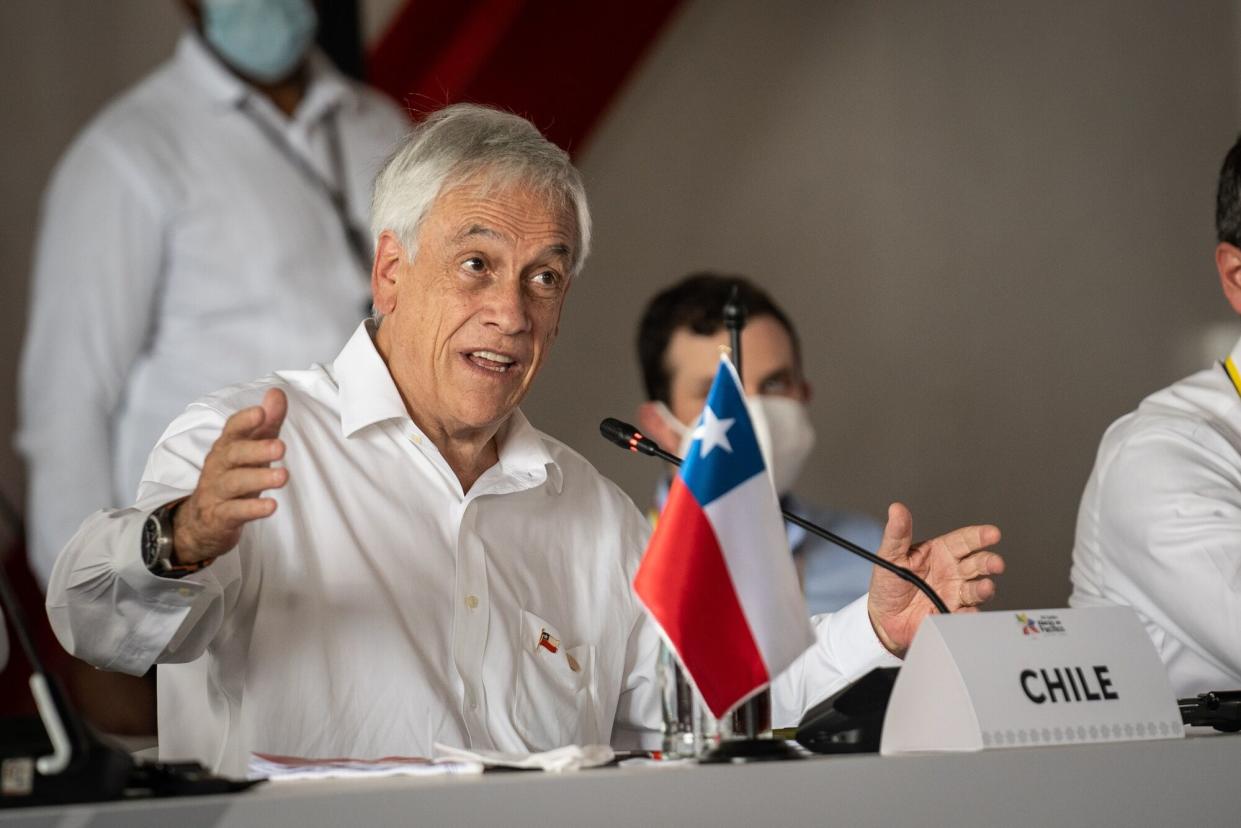Sebastian Pinera’s Death Forces Hard Questions for Chile’s Political Right

(Bloomberg) -- Sebastian Pinera’s sudden death deprives Chile’s right wing of a unifying force, leaving those parties with a stark choice between pursuing the former president’s liberal, pragmatic view, or shifting to a new more conservative and populist agenda.
Most Read from Bloomberg
S&P 500 Rally Hits a Wall in Run-Up to CPI Report: Markets Wrap
Once-Bitten Europe Is Better Prepared for Trump’s NATO Tirades
Pinera was killed in a helicopter crash in the south of the country on Tuesday at the age of 74, bringing an abrupt end to growing speculation that he could run for a third term in office.
Right-wing parties are girding for a comeback to the nation’s top job in 2025, as leftist President Gabriel Boric grapples with low popularity, a weak economy and concerns over crime. Two conservative politicians, Evelyn Matthei and Jose Antonio Kast, consistently rank atop polls for head of state, though they represent different views on the way forward.
Traditional, right-wing parties including Matthei’s Union Democrata Independiente competed separately from Kast’s more extreme Partido Republicano last year. There’s been no decision on joining forces even in October’s local elections, which will be a crucial test of their strength.
Amid that uncertainty, polls showed Pinera rising as an alternative among the top presidential contenders, with one survey from late January placing him in third. His death robs the right of a figure who enjoyed support across parties and was capable of breaking through polarization to forge agreements — at least within conservative groups.
“Looking out over the political landscape, you don’t see leaders of the magnitude of Pinera on the right,” said Axel Callis, a sociologist and director of pollster Tuinfluyes.com. “Pinera’s movement consisted of independents and party members across the entire political right. It went beyond parties and, even at some points, had more power than they did.”
Read More: Sebastian Pinera, Chile Billionaire Ex-President, Dies at 74
At stake is political leadership for one of Latin America’s richest nations, which saw growth falter just as it was approaching the level of some developed nations. It is now struggling to move beyond a period of high inflation and stagnation exacerbated by two failed attempts to rewrite the constitution.
In recent years, right-wing parties have lost the presidency in nations like Mexico, Brazil and Colombia, where they are now also trying to plot comebacks.
Logical Choice
Pinera rose from senator to become president in 2010 and again in 2018. After voting against the continued dictatorship of Augusto Pinochet in 1988, he went on to help mold a new right wing that focused more on economic liberalism than Catholic conservatism and authoritarianism.
For many Chile-watchers, Matthei is the logical choice to carry on Pinera’s work. While she and Pinera have had differences, their agenda was more economic, with an emphasis on finding common ground and working with political partners.
Kast, by contrast, bases many of his views on a strict interpretation of Catholicism, taking pride in his purity of mission.
Pinera “taught the right something that’s basic but difficult to achieve: how to win,” Mauricio Morales, a professor of political science at Chile’s Universidad de Talca, wrote on X, the platform formerly known as Twitter. “He was worried about the rise of an authoritarian or populist right. Evelyn Matthei is the one to continue this important legacy.”
But many remain skeptical. Matthei lacks Pinera’s ability to reconcile viewpoints and hasn’t been able to unite her own party behind her as a presidential candidate, according to Callis, from Tuinfluyes.com.
To be sure, Pinera faced stiff criticism during his time in office, most notably for his heavy-handed response to social unrest that exploded in late 2019, leaving dozens of protesters dead or maimed. During his second administration, his approval rating sank as low as the single digits, the worst in Latin America.
But his shock death has prompted an outpouring of grief from across the political spectrum.
“One notes the influence that Sebastian Pinera had not only in his sector, but rather in all of politics,” said Ramon Cavieres, executive director of research firm Activa Research and spokesperson for its Pulso Ciudadano poll. “There will now be adjustments, and an analysis of the vision that he had.”
Most Read from Bloomberg Businessweek
OpenAI’s Secret Weapon Is Sam Altman’s 33-Year-Old Lieutenant
How Jack Dorsey’s Plan to Get Elon Musk to Save Twitter Went South
©2024 Bloomberg L.P.



